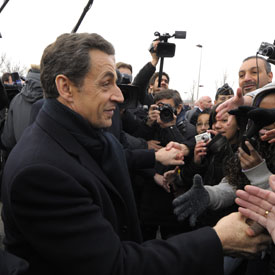Tarnished Sarkozy launches re-election bid
Nicolas Sarkozy launches his bid for a second term on Wednesday night, but polls suggest he’s the most unpopular incumbent president in French history, and is trailing far behind his socialist rival.
With the first round of voting due on 22 April, he had wanted to wait for a lightning campaign – but President Sarkozy is trailing so badly in the polls that he’ll be declaring his candidacy for a second term on television on Wednesday night. Mr Sarkozy revealed his plans on the social networking site Twitter, with more details to come in a major campaign rally on Sunday, in the southern city of Marseilles.
Popularity slump
He’ll have a tough battle – with approval ratings languishing at 36 per cent, he’s presided over a series of highly unpopular reforms and austerity measures. And with crisis overshadowing the whole of the eurozone, Sarkozy is trying to pitch himself as a ‘captain in the storm’, against his relatively inexperienced Socialist opponent Francois Hollande, who has never held a government post. The voters aren’t buying it so far: at the moment, Hollande is comfortably ahead in the polls, with a projected 5.5 per cent lead in the first round.
Now the real campaign starts. Alain Juppe, Foreign Minister
It’s all very different from 2007, when Sarko was swept to power as the most popular leader since General de Gaulle. He took a hatchet to the 35-hour working week, limited taxes on the most wealthy, expelled tens of thousands of immigrants and banned women from wearing the niqab. But the global financial crisis was to wreak havoc with the French economy: notwithstanding unexpected growth figures on Wednesday of 0.2 per cent – pretty respectable by current European standards – the number claiming unemployment benefit has soared to a 12-year high, debt has risen by a third to 85 per cent of GDP, while the trade deficit has also rocketed.
President Bling-Bling
And while his countrymen have been feeling the pinch of recession, with some 15m French people struggling to make ends meet, Sarkozy himself has been revelling in the taxpayers’ largesse. A new book, by Socialist MP Rene Dosiere, claims he spends an extraordinary £10,000 a day on food and keeps more than 120 cars at his official home in the Elysee Palace. Dinner – the likes of lobster carpaccio and calves cheeks – is washed down most nights with £160 bottles of wine. He spent £150,000 of public money on protection for his DJ son, and there’s a plan for an 80,000 euro statue of his wife Carla Bruni – more than half of it funded by the taxpayer.
Mr Sarkozy has already set out much of his platform, not least in a 15 page spread in the glossy Le Figaro magazine: and, like 2007, he’s courting support from the far right. There’s another pledge to curb immigration, and a rejection of same-sex marriage and adoption. He plans to cut welfare benefits to unemployed people who turn down work – with the threat of a referendum if unions disagree. And, as befits the times, there’s the almost obligatory bank bashing, condemning bankers for abusing freedom to “make more money, more quickly and without limit”.

Pitch to the Right
A pitch to the right might seem a sensible option: the National Front’s Marine Le Pen is snapping at his heels, with her uncompromising anti- European, anti-immigration stance. “We have welcomed 10m foreigners in the last 30 years”, she told ABC News. “Today, we can’t afford to welcome them any more. We don’t have jobs any more, we don’t have housing any more.”
Those who have benefited from crazy pay levels will have to make an effort. Francois Hollande
But Sarkozy can’t afford to alienate the centre ground, with his main threat coming from the Left. Francois Hollande, once dubbed Monsiur Flamby, or Mr Pudding, because of his portly figure and somewhat flabby political reputation, is now the man of the moment. His ambitious 60-point plan makes a nod towards austerity measures, including a pledge to slash the defit by 2013, but the emphasis is all about tax hikes: raising the top rate of income tax to 45%, capping tax breaks for the rich and imposing a higher rate on France’s biggest companies. “Those who have benefited from crazy pay levels will have to make an effort”, he declared, while promising more state investment, job creation and a ‘more moral capitalism’.
Eurozone fears
Victory for Hollande could have profound implications well beyond the borders of France. While Sarkozy has thrown in his lot with Germany’s Chancellor Angela Merkel, and the new treaty agreed by 25 EU leaders imposing a tough new budgetary regime, his rival wants to rip it up and start again. As the German newspaper Suddeutsche Zeitung put it: “The greatest living danger to Merkel’s fiscal pact is called Hollande”.
Right now, though, to millions of French families, it’s Sarkozy who’s looking like the greatest living danger – not to some European pact, but to their own prosperity. “Now the real campaign starts”, declared his close ally and Foreign Minister Alain Juppe. But with his popularity at such a nadir, and his personal image so tarnished, Sarkozy will have to pull off the fight of his life.